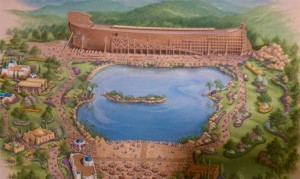Earlier today it was announced that a full-size replica of Noah’s Ark is going to be built over the next few years in Kentucky. More details will be forthcoming and many can already be found on the Ark Encounter website.
This exciting project is going to be enormous. It is estimated to bring approximately 900 new jobs to the area along with 1.6 million visitors in the first year alone.
Far more important than the amount of revenue and jobs is the spiritual impact this place can have. People will be able to see firsthand that the Ark wasn’t just a cute little boat overflowing with animals, as is so often portrayed. It was enormous and had plenty of room for all of the necessary creatures, food, and Noah’s family. This place will also demonstrate the accuracy of the biblical account of the Ark and Flood.
Undoubtedly, critics and scoffers will take aim at the Ark Encounter. In fact, many of them already have, beginning with an early effort to beg Governor Beshear (KY) to refrain from publicly announcing the project this morning. I expect to see numerous lawsuits filed by skeptics wishing to stop the construction of the Ark.
It is interesting (but sad) to watch the skeptics panic. Just like when the Creation Museum was built, skeptics decried its construction by making all sorts of baseless accusations. If they are so convinced that their evolutionary beliefs (religion) are factual, then they should not fear competition from those who believe the biblical account.
The fact is that they don’t want anyone to expose their house of cards (evolution, big bang, etc.) nor do they want people to hear the truth of God’s Word. Ultimately, that’s what this comes down to. Many skeptics today have a bitter hatred toward anything biblical and they fear the possibility that people will learn the truth. Romans 1:18 says that they “suppress the truth in unrighteousness.”
Since they cannot refute the true history of world as recorded in Scripture, they resort to mockery. They use the same tired questions that have been answered for decades. And all during their mocking, they actually fulfill the words written by the Apostle Peter nearly 2,000 years ago:
3 First of all, you must understand that in the last days scoffers will come, scoffing and following their own evil desires. 4 They will say, “Where is this ‘coming’ he promised? Ever since our fathers died, everything goes on as it has since the beginning of creation.” 5 But they deliberately forget that long ago by God’s word the heavens existed and the earth was formed out of water and by water. 6 By these waters also the world of that time was deluged and destroyed. 7 By the same word the present heavens and earth are reserved for fire, being kept for the day of judgment and destruction of ungodly men.
8 But do not forget this one thing, dear friends: With the Lord a day is like a thousand years, and a thousand years are like a day. 9 The Lord is not slow in keeping his promise, as some understand slowness. He is patient with you, not wanting anyone to perish, but everyone to come to repentance. (2 Peter 3:3—9, NIV)
Peter told his readers that scoffers (mockers) will come in the last days who would specifically mock three biblical doctrines: the Creation, the Flood, and the Second Coming. They would do this while clinging to a belief that states “everything goes on as it has since the beginning.” Is it just mere coincidence that this belief sounds just like uniformitarianism (“the present is the key to the past” or the present processes explain how it has always been), which is the underlying philosophy of every old-earth/universe view?
They mock the Second Coming because they don’t like the idea of being accountable to their Creator. They mock the Flood because it is a reminder of God’s judgment on this world. They mock the Creation because their philosophy (belief system) prevents them from believing in the supernatural Creator who sets the rules.
All the while, God remains patient in bringing the much-deserved judgment to this earth because “He is patient with you, not wanting anyone to perish, but everyone to come to repentance” (2 Peter 3:9).
The mockers may keep on mocking, but all the while they are fulfilling the words of Scripture penned nearly 2,000 years ago. Yet some day God’s patience will run its course and Christ will return in judgment. In Noah’s day, those who refused the gracious offer to escape the Flood in the Ark perished. In a similar fashion, those who refuse to accept God’s gracious offer of salvation (through the sacrifice of Christ on the Cross), will perish and they will be separated from God for eternity.
I pray these people will see their need for the Savior and repent before it is too late. May God bless the efforts of all who are involved in building the Ark. It will stand as a testimony of the true history of our world. It will also stand as a solemn reminder of the coming judgment and as a picture of Christ, who died in our place on the Cross and is the only Way to escape the coming judgment.


